Encinitas Landscape Transformation Project Wins Local Contest
Encinitas, Calif. — Olivenhain Municipal Water District’s Board of Directors honored at its July 14 meeting Ken and Susan Terzes as the winner of OMWD’s 2021 WaterSmart Landscape Contest.
Encinitas, Calif. — Olivenhain Municipal Water District’s Board of Directors honored at its July 14 meeting Ken and Susan Terzes as the winner of OMWD’s 2021 WaterSmart Landscape Contest.
July 13, 2021 — Padre Dam Municipal Water District’s Board of Directors voted (4-1) to resume billing late fees on utility bills for unpaid past due balances beginning August 1, 2021 after pausing fees during the COVID-19 pandemic. Additionally, the District will resume water service shutoffs for non-payment beginning on October 1, 2021. The District is returning to pre-pandemic policies set forth in its Rules and Regulations to ensure compliance with California State Laws.
July 8, 2021 – Sandra L. Kerl, general manager of the San Diego County Water Authority, issued the following statement on today’s expanded drought declaration and proclamation of a state emergency by Gov. Gavin Newsom and his call for Californians to voluntarily reduce water use by 15%:
“While the San Diego region is thankfully drought-safe this summer due to sound planning and decades-long ratepayer investments in new water supplies and storage and adoption of water conservation as a way of life, we must also be part of the statewide movement now underway to address water supply challenges created by drought and climate change in other parts of California.
“The Water Authority strongly supports the governor’s call for the public to voluntarily cutback water use by 15% in order to allow local, regional and state water agencies to plan and take the steps necessary under these changed conditions to maximize the availability of limited water supplies going forward, through the investment of state funding and implementation of other provisions of the Governor’s Proclamation of a State Emergency and Executive Order N-10-21 calling for water conservation.
“The Water Authority will be working closely with our member agencies and with the Metropolitan Water District of Southern California over the next several days, weeks and months, to design and implement strategies to maximize water supply development in collaboration with Governor Newsom and state agencies, in order to protect California.”
Information about the Water Authority’s water-use-efficiency programs is at www.watersmartsd.org/.
Chula Vista, Calif. – The Sweetwater Authority Governing Board approved the budget for fiscal year 2021-22 at its June 9, 2021 meeting with a net zero impact to customer rates.
The San Diego County Water Authority’s Mission Trails FRS II water project is now more than halfway complete.
The project will upgrade the Water Authority’s untreated water system in Mission Trails Regional Park. When finished in 2022, the upgrades will provide more reliable water delivery to treatment plants that serve the central and south sections of San Diego County.
Construction began in March 2020 just as the coronavirus pandemic began. As an essential infrastructure project, construction on the water project continued during the pandemic.
The project includes construction of a new 5-million-gallon underground covered tank, flow control facility and pipeline connections. The largest component of the project is the building of the underground tank called a flow regulatory structure (FRS II) which will be used to balance flows in the aqueduct system.
One June 11, the pouring of concrete to create the roof for FRS II began. FRS II will be the second underground water tank in the park – both work to efficiently move water through the region.
Construction efforts are also underway to build the new flow control facility. Once construction is complete, the work area will be graded to its previous contours and revegetated with native plants – many seeded from plants within the park itself.
New construction activities have begun about a half mile north of the FRS II. This most northern construction site will be used to connect the water flowing through the Water Authority’s pipelines to the FRS II.
To keep trail users safe, some trails are closed through early 2022 when work is complete. Signs are posted to clearly mark the closures, detours and provide a map to find alternative routes. In addition, the Water Authority created an interactive map showing the location of the closed trails. Go to www.sdcwa.org/mission-trails-FRS to view the map and learn more about the project.
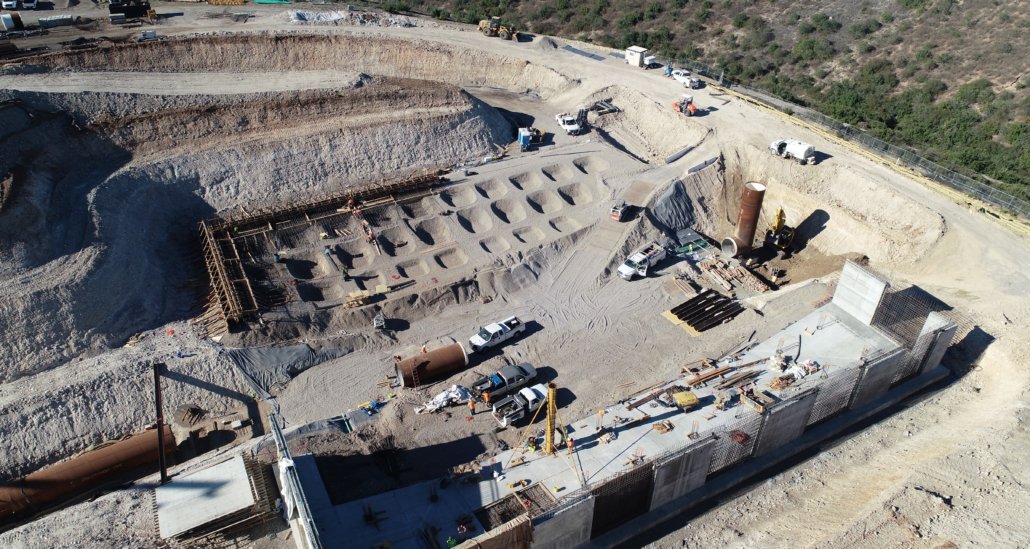
Construction crews formed and poured the walls of the Flow Regulatory Structure in December 2020. Photo: San Diego County Water Authority
The Sweetwater Authority has added another day for the public to enjoy activities at the Sweetwater Reservoir in Spring Valley. Previously open Saturdays through Mondays, the Authority expanded operations to include Fridays to give residents more opportunities to get outside and experience nature this summer.
Starting Friday, July 2, Sweetwater Reservoir will be open so that San Diego County residents can enjoy fishing, hiking, biking and bird watching. The reservoir hours are 7 a.m. to 5 p.m.
The addtional day also means another day for the Sweetwater Authority Shoreline Fishing Program.
“Our Fishing Program provides cost-effective, fun and educational recreational opportunities for San Diego County residents of all ages,” said Sweetwater Authority Board Chair Hector Martinez. “We’re pleased to expand this program to include Fridays and welcome residents to enjoy the beauty of our water and the environment this Independence Day weekend.”
In addition to the Sweetwater Reservoir, shoreline fishing is also available at the Authority’s Loveland Reservoir near Alpine.
Both lakes host a healthy population of bass, catfish, bullhead, bluegill, perch, rock bass and more. Catch and release is encouraged to avoid overfishing, and anglers must comply with California Fish and Game regulations.
The Sweetwater Reservoir provides shoreline fishing along a 2.5-mile stretch on the south side of the reservoir. Access is via San Miguel Road in Bonita near Sweetwater Summit Park.
Hours of Operation:
Fridays, Saturdays, Sundays and Mondays
7 am to 5 pm, March – September
7 am to 4 pm, October – February
Daily Fees:
$5 per adult
$2 per child under 16 (must be with an adult)
$3 per car for non-fishing visitors
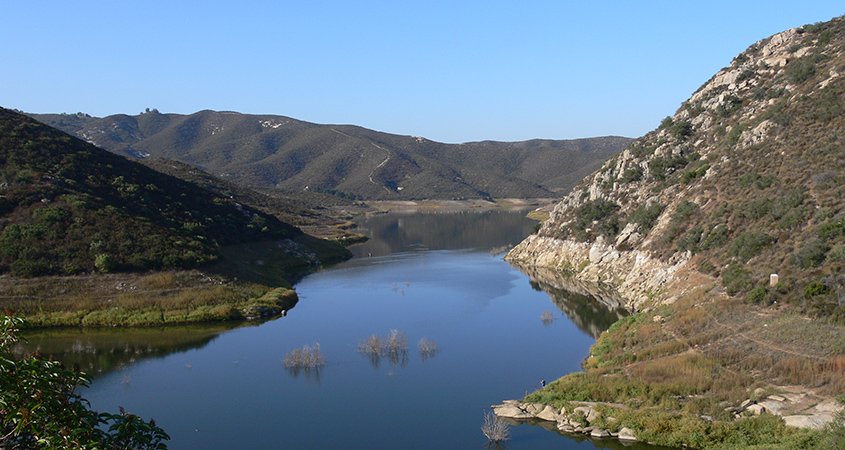
Shoreline fishing is available at Loveland Reservoir near Alpine. Photo: Sweetwater Authority
The Loveland Reservoir provides fishing along a five-mile portion of the shoreline. Access is via the Interstate 8 East to Tavern Road/Alpine off-ramp.
Hours of Operation:
Open Daily
6 am to 6 pm, March – September
6 am to 5 pm, October – February
Daily Fees:
There are no fees to access Loveland Reservoir.
A California State Fishing License is required at both reservoirs for those 16 and older, and adult supervision is required for children under the age of 16.
(Editor’s note: The Sweetwater Authority is one of the San Diego County Water Authority’s 24 member agencies that deliver water across the metropolitan San Diego region.)
The San Diego County Water Authority’s Board of Directors today adopted a $1.7 billion budget for fiscal years 2022 and 2023 – a 0% change from the current two-year budget – and approved water rates and charges for 2022, following a public hearing.
The all-in rate, which is a blend of fixed and variable rates, will rise by 3.6% for treated water and 3.3% for untreated water in calendar year 2022, due to more rate increases by the Los Angeles-based Metropolitan Water District of Southern California, continued payments for past investments in supply reliability, and inflationary pressures on energy, chemicals, and construction materials. Actual water bills will vary based on customers’ water use, along with factors unique to their local retail water agencies.
“I’m proud of this budget and rates package in an era of unprecedented challenges,” said Water Authority Board Chair Gary Croucher. “We have contained costs while benefitting from strategic investments in water supply reliability that protect the region’s $253 billion economy and 3.3 million residents from statewide drought conditions. This achievement is only possible due to collaboration with our member agencies, strategic guidance from the Board, and the dedication of agency staff.”
More than 90% of the two-year budget is for buying and treating water or building and financing infrastructure. Seven percent of the budget for Fiscal Years 2022 and 2023 funds the Water Authority’s operating departments. The budget increase for those departments is 2%, or $1.9 million, compared to the current two-year budget.
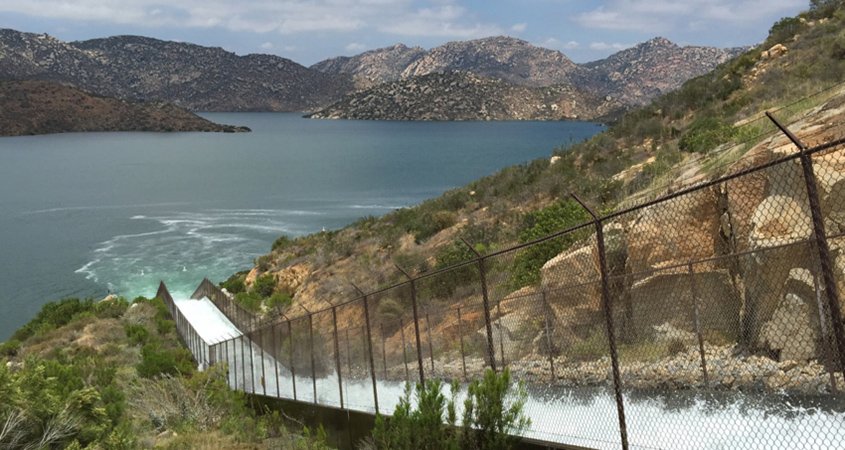
The San Diego County Water Authority Board of Directors May 27 approved the Water Authority’s 2020 Urban Water Management Plan highlighting a “water portfolio approach” that ensures reliable water supplies for the region through the 2045 planning horizon – even during multiple dry years. Photo: San Diego County Water Authority
Although the Water Authority’s budget spans two fiscal years, the agency sets rates annually to manage changing conditions more effectively. The Water Authority developed its 2022 water rates in conjunction with an independent cost-of-service study to ensure rates and charges comply with state law, legal requirements, cost-of-service standards, and Board policies.
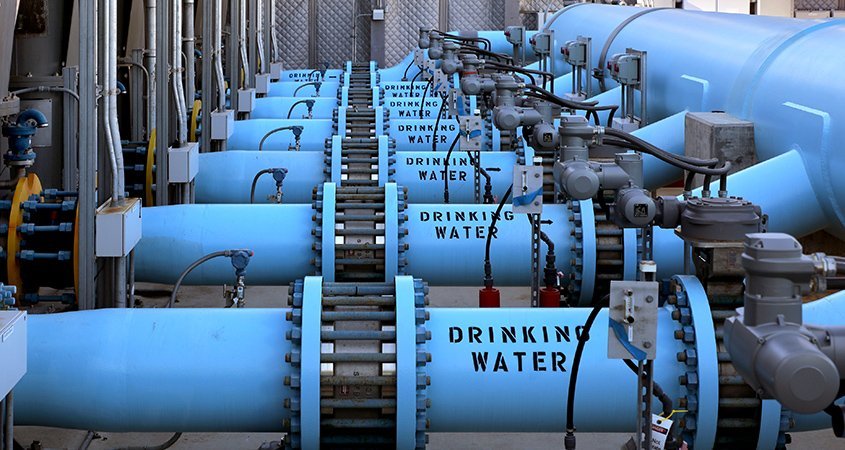
The San Diego region’s diversified water supply portfolio includes highly reliable, locally controlled and drought-proof supplies from the Claude “Bud” Lewis Carlsbad Desalination Plant. Photo: San Diego County Water Authority
The Water Authority also worked closely with its member agencies to keep the proposed rates and charges at the low end of earlier projections.
In 2022, the Water Authority will charge its 24 member agencies an all-in rate of $1,523 per acre-foot for untreated water, or $49 more per acre-foot than they currently pay. Charges would be $1,833 per acre-foot for treated water, or $64 more per acre-foot than in 2021. (Note: An acre-foot is about 325,900 gallons, enough to serve the annual needs of 2.5 typical four-person households in San Diego County.)
The Water Authority’s overall rate increase is driven by multiple factors, including rising costs from its wholesale water provider, MWD. MWD increased its rates, including the amount it charges to transport the Water Authority’s lowest cost regional supply – high-priority, independent supplies from the Colorado River. Overall, MWD’s rates and charges for the Water Authority in 2022 will increase 3.9%.
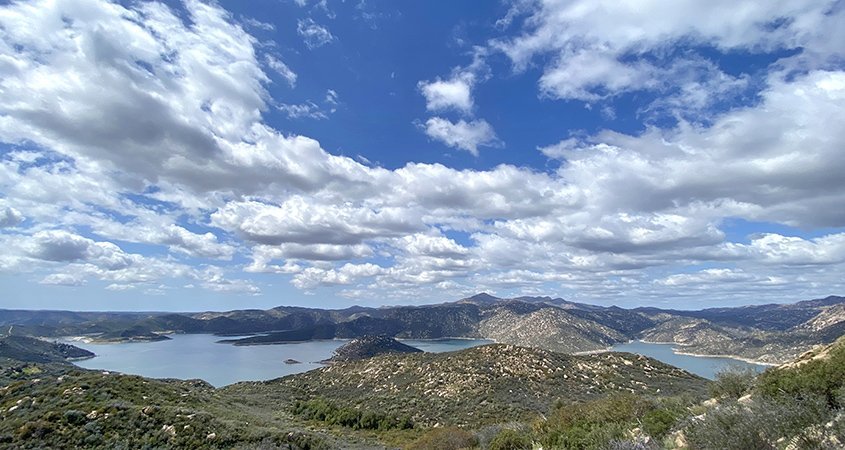
The San Diego County Water Authority said June 21, that the region is protected from drought impacts this summer, and through 2045, despite continued hot and dry conditions. Photo: San Vicente Reservoir/San Diego County Water Authority
The water rates for calendar year 2022 include strategic withdrawals from the Rate Stabilization Fund. To reduce 2022 rate increases by approximately $65 per acre-foot, the Water Authority plans to draw $25 million from the agency’s Rate Stabilization Fund. The fund was created in 1990 to help avoid rate spikes, especially those driven by reduced water sales. The rate proposal also includes strategic management of the Water Authority debt portfolio resulting in $130 million in net present value savings from several refundings.
The 2022 rates ensure debt-coverage ratios that maintain the Water Authority’s strong credit ratings and minimize the cost of borrowing money for construction projects, an approach that saves ratepayers money over the long run. The Water Authority has senior lien credit ratings of AAA from Standard & Poor’s, AA+ from Fitch ratings and Aa2 from Moody’s.
For more information about the Water Authority’s 2022 and 2023 budget, and 2022 rates, go to pages 58 and 69 in the June Board packet.
June 24, 2021 – The San Diego County Water Authority’s Board of Directors today adopted a $1.7 billion budget for fiscal years 2022 and 2023 – a 0% change from the current two-year budget – and approved water rates and charges for 2022, following a public hearing.
The all-in rate, which is a blend of fixed and variable rates, will rise by 3.6% for treated water and 3.3% for untreated water in calendar year 2022, due to more rate increases by the Los Angeles-based Metropolitan Water District of Southern California, continued payments for past investments in supply reliability, and inflationary pressures on energy, chemicals, and construction materials. Actual water bills will vary based on customers’ water use, along with factors unique to their local retail water agencies.
Once an unused pool, now a water-wise backyard oasis. Helix Water District announced Rosalie Dosik of Mt. Helix as the winner of its 2021 WaterSmart Landscape Contest. The annual competition recognizes outstanding water-wise residential landscapes based on overall attractiveness, design, efficient irrigation and appropriate plant selection and maintenance.
Helix Water District is proud to announce the winners of the 2021 Lake Jennings Spring Photo Contest, with this year’s first place in the adult category going to photographer Johnathan Bradley of Lemon Grove for his image titled Open Field.
Now in its 10th year, the contest drew 61 entries from throughout the county. This year’s theme was Life at the Lake, and each of the entries highlighted the unique beauty of camping, fishing, hiking, spotting wildlife and enjoying the view at Lake Jennings.